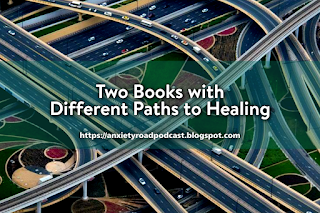There isn't one path to healing. There can be dozens but when you are in the thick of it you only care about what works now.
So you might decide, you have stuff to do, you don't have time for introspections, give me the pill.
And it might work for you. Until it doesn't. Or your symptoms change. Or your anxiety expresses itself as anger. Or overeating. Or hording.
It can happen that you do meditation. You monitor your nutrition. You run a mile a day.
And your symptoms still make you feel like a scared, helpless person. Treatment isn't always linear.
You might have to mix it up.
In this episode a look at two books that are very different from each other. Both offer a path to healing and treatment. It might work for you, it might not.
But these are accessible options to consider.
If you need support contact the National Suicide Prevention Lifeline at 1-800-273-8255, the Trevor Project at 1-866-488-7386 or text “START” to 741-741.
Resources Mentioned:
Brown University Robert J. & Nancy D. Carney Institute for Brain Science, a news article about Mechanical Affective Touch Therapy (MATT)
For those of you that want to check out the trial evaluation there is an open article Mechanical Affective Touch Therapy for Anxiety Disorders: Effects on Resting State Functional Connectivity on Science Direct that gives the details of the trial testing and results.
Dushka Zapata For All I Know; A Shebang Checklist for Life. You can find most of her writing for free on Quora but she does have books for sale at Amazon.
The ABCS of Coping Using CBT to Manage Stress and Anxiety by James Cowart Ph.D. published by Crown House Publishing. You can visit the publishers web site or order the book via your favorite book vendor.
Author Matt Haig 2014 post on Reasons to Stay Alive.
Links to other sites are provided for information purposes only and do not constitute endorsements.
Always seek the advice of a qualified health provider with questions you may have regarding a medical or mental health disorder.
This blog and podcast is intended for informational and educational purposes only. Nothing in this program is intended to be a substitute for professional psychological, psychiatric or medical advice, diagnosis, or treatment.
Disclaimer:
Links to other sites are provided for information purposes only and do not constitute endorsements.
Always seek the advice of a qualified health provider with questions you may have regarding a medical or mental health disorder.
This blog and podcast is intended for informational and educational purposes only. Nothing in this program is intended to be a substitute for professional psychological, psychiatric or medical advice, diagnosis, or treatment.








No comments:
Post a Comment
Always seek the advice of a qualified health provider with questions you may have regarding a medical of mental health disorder. Comments are moderated; play nice and be fair.